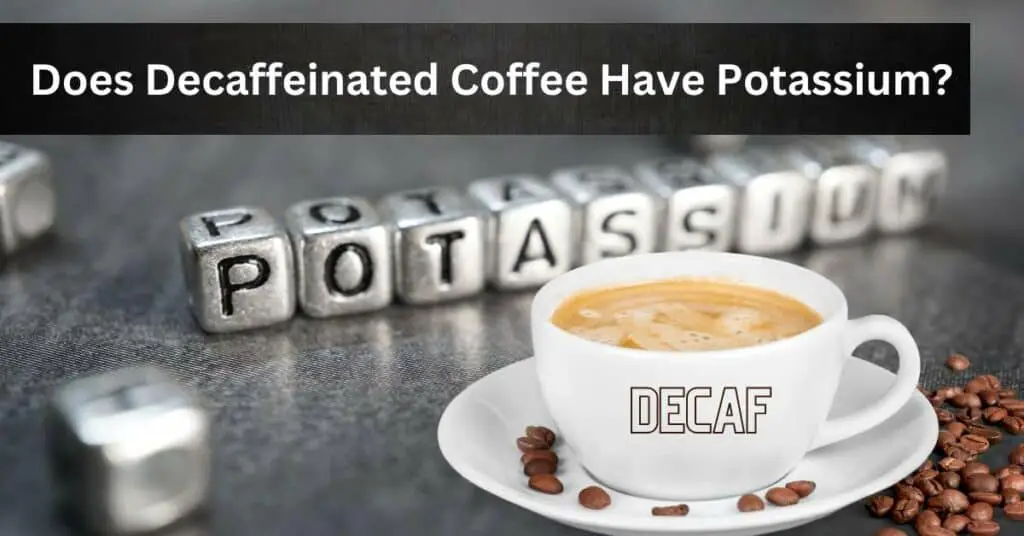Starbucks is well known for providing customers with their preferred coffee in a variety of flavors and strengths.
Starbucks offers a variety of beverages for any taste, whether you prefer a light, decaf latte or a cup of coffee with an espresso shot.
Do you know how Starbucks decaffeinates its coffee, though?
The majority of people think it’s a mystery, but there’s actually a method behind it.
In this blog post, we will be discussing the methods that Starbucks uses to remove caffeine from their coffee beans.
So that you can enjoy a delicious cup of coffee without worrying about caffeine jitters.
So grab your preferred Starbucks beverage and keep reading!
Introduction To Starbucks Decaf Coffee.
Starbucks is a well-known brand in the coffee industry, and they provide a variety of decaf coffee selections.
For people who still want to enjoy a cup of coffee but don’t want the stimulant properties of caffeine, decaffeinated coffee is ideal.
Starbucks decaffeinates its coffee using a variety of techniques, including the direct contact method, the Swiss Water Process, and CO2 process.
It’s important to know that methylene chloride, a solvent, is used to make the majority of their decaf coffee.
For those who would rather have a chemical-free option, Starbucks also has a decaf Sumatra brew that has been “naturally processed”.
Customers can enjoy a fresh, single cup of decaffeinated coffee on demand with their decaf Pour-Over option.
Customers can choose from a variety of decaf coffee blends at Starbucks.
How Does Starbucks Decaffeinate Their Coffee?

To decaffeinate their coffee, Starbucks employs both the direct contact method and the Swiss water process.
To extract caffeine from the beans, the direct contact approach uses the chemical solvent methylene chloride.
Starbucks does, however, provide a naturally processed decaf Sumatra brew that employs ethyl acetate, which is found in fruits, to remove caffeine.
In the finished product, this technique leaves no recognizable signs of the chemical.
The naturally processed alternative is a fantastic option for anyone who is worried about consuming chemicals in their decaf coffee.
Starbucks guarantees that its decaf coffee has had 97% or more of its caffeine removed, regardless of the process employed.
This makes it a wonderful choice for individuals who want to enjoy the flavor of coffee without the jitters.
What Is Methylene Chloride, And Why Is It Used?
Coffee is decaffeinated using methylene chloride, a chemical solvent.
It is still commonly utilized in the coffee business despite safety issues that have been brought up.
Due to its strength as a solvent, methylene chloride can efficiently and swiftly extract caffeine from coffee beans.
It is employed in the “direct contact” decaffeination method, in which the solvent is soaked into the beans to draw out the caffeine.
The quantity of methylene chloride left in decaf coffee after processing is minuscule, although it is a known carcinogen and can have negative health effects in high concentrations.
It’s still necessary to be aware of this chemical’s use in the production of decaf coffee and to think about more natural and chemical-free decaffeination techniques.
How Is Coffee Decaffeinated? 4 Safe Methods
The blog now goes into the various processes required to make decaf coffee after presenting Starbucks’ decaf coffee and going over their decaffeination procedure.
There are four secure ways to remove the caffeine from coffee, all of which call for soaking the beans in warm water.
01.Swiss Water Process
The first technique is the Swiss water process, which involves soaking coffee beans in hot water and filtering them using activated carbon.
With this technique, caffeine is eliminated from coffee without changing its flavor profile.
02.Liquid Carbon Dioxide Method
The liquid carbon dioxide is used to extract caffeine using the second method, the carbon dioxide procedure.
The environmental friendliness of this technology is an extra bonus.
03. Ethyl Acetate Process
The third approach uses an ester that may be found in fruits like apples and bananas.
It is called the ethyl acetate process, and as was already explained, it is a natural process.
04.Indirect Solvent Method
The indirect solvent method includes soaking the beans in water that has been nearly brought to a boil to extract the caffeine and other flavorings.
Coffee enthusiasts can make wise judgments regarding their coffee consumption, especially if they choose decaf, by being aware of how these safe methods operate.
What About The Natural Process Of Making Decaf Coffee Using Ethyl Acetate Found In Fruits?

Starbucks, like many other coffee producers, decaffeinates its coffee beans naturally.
Ethyl acetate, an ester that can be found in fruits like apples and bananas, is used in this method.
The ethyl acetate dissolves in the bean’s organic oils to produce an extract that almost entirely contains the bean’s caffeine content.
Since ethyl acetate is a naturally occurring substance, this decaffeination procedure is frequently referred to as the “natural process”.
Given that ethyl acetate is frequently employed in the manufacturing of numerous foods and beverages, this procedure is generally regarded as safe.
Why Do People Like Decaf Coffee?
While many individuals appreciate the flavor and scent of coffee, they may not desire the energizing properties of caffeine.
Caffeine may make some people anxious, jittery, or sleepless.
Others might need to avoid caffeine due to a medical issue, such as high blood pressure.
For people who enjoy coffee but must avoid caffeine for different reasons, decaffeinated coffee offers an option.
Decaffeinated coffee may be the better option for those attempting to drink more fluids because some people believe it to be more hydrating than normal coffee.
Additionally, while being caffeine-free, decaf coffee can still offer a similar flavor and level of enjoyment as normal coffee.
Decaf coffee can also serve as a good option for those who enjoy coffee later in the day to avoid disrupting their sleep cycle.
Ultimately, many coffee lovers enjoy the taste and aroma of a good cup of coffee, and decaf options allow them to enjoy it without the potential disturbances of caffeine.
How Much Caffeine Remains In Decaf Coffee?
You might be wondering about how much caffeine actually remains in decaf coffee after learning about the various decaffeination processes.
Decaf coffee must, in fact, have at least 97% of the caffeine removed to meet the worldwide standard for decaffeination.
Decaf coffee, therefore, includes just a very little quantity of caffeine that is essentially unnoticeable, even if it is not entirely caffeine-free.
Who Can Drink Decaf Coffee?

For individuals who enjoy the flavor of coffee but don’t want to drink caffeine, decaffeinated coffee is a terrific option.
Anyone who wishes to cut back on their caffeine intake or who is caffeine sensitive should drink decaffeinated coffee.
Decaf is a wonderful choice for pregnant women because they are frequently advised to decrease their caffeine intake.
Decaf is advantageous for those who have high blood pressure, heart disease, or anxiety. Even kids and teenagers can drink decaf coffee without any negative effects.
So, if you love the taste of coffee but want to avoid the jitters or sleepless nights, go ahead and switch to decaf – it’s a great option for everyone!
Conclusion
In conclusion, Starbucks employs the Swiss water procedure and the methylene chloride technique to decaffeinate their coffee.
The solvent methylene chloride is burned off during the high roasting temperature, although it is utilized in the direct contact process.
Starbucks also brews decaf coffee on demand using the pour-over technique.
Although the majority of the caffeine has been taken out of the coffee beans, decaf coffee is not entirely caffeine-free.
Decaf coffee is an option for customers who are sensitive to caffeine or who want a late-night beverage.
Decaf coffee has also been reported to benefit people with kidney issues.
Starbucks offers a variety of decaf coffee alternatives to suit the needs of its diverse clientele.
FAQs
01.Is Decaf Coffee Better For Your Kidneys?
For individuals worried about their kidney health, decaffeinated coffee might be a better option.
Regular coffee might stress the kidneys and raise blood pressure.
Contrarily, decaffeinated coffee doesn’t include any caffeine that can raise your blood pressure.
This lowers the possibility of kidney failure and injury.
Additionally, some research suggests that drinking decaf coffee may have advantages including increased mental clarity and alertness.
Although decaf coffee has fewer antioxidants than regular coffee, it still possesses healthy ingredients.
Therefore, decaf coffee might be an excellent choice for coffee drinkers who want to reduce their caffeine intake and support the health of their kidneys.
02.How Does Mcdonald’s Decaffeinate Their Coffee?
Using the Swiss Water Process to remove the caffeine from their beans, McDonald’s also sells decaffeinated coffee.
In this procedure, the caffeine is first removed from the coffee beans by soaking them in hot water, and any remaining caffeine is subsequently removed from the water by filtering it through activated carbon.
The inherent characteristics of the coffee are preserved during this procedure, giving customers a delicious decaf choice.
So, McDonald’s decaf is a secure and satisfying solution for individuals who want a coffee without caffeine.
03.Is It Bad To Drink Decaf Coffee Every Day?
Despite the common belief that drinking decaf coffee could have negative effects, multiple studies suggest that it is safe to consume decaf coffee every day.
According to specialists, it might even provide certain health advantages, such as lowering the risk of type 2 diabetes or liver disease.
It’s crucial to keep in mind that some decaffeination procedures include substances like methylene chloride, which, when consumed in big doses, can have harmful effects on the body.
Consequently, it is advised to pick decaf coffee that has been decaffeinated naturally, such as by using ethyl acetate found in fruits.
Overall, as long as it is consumed, drinking decaf coffee every day can contribute to living a healthy lifestyle.
Best Wishes!












